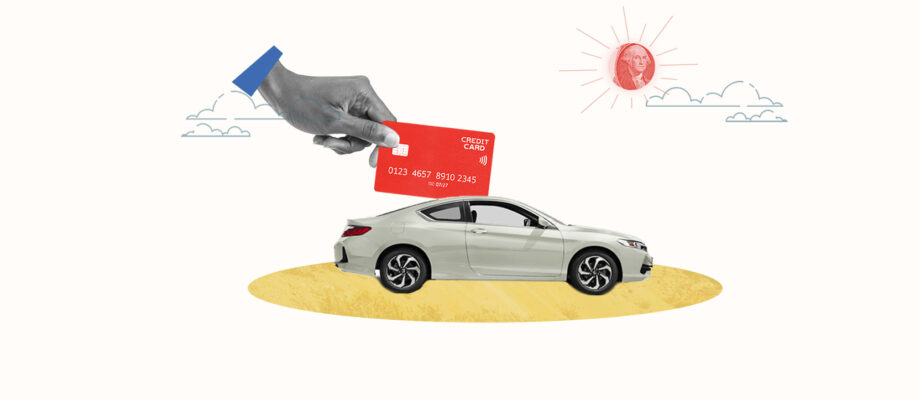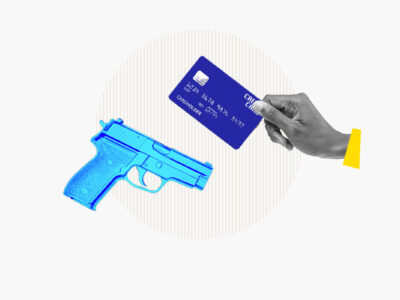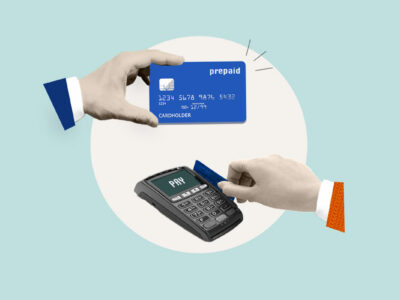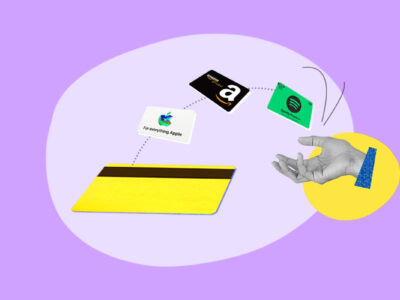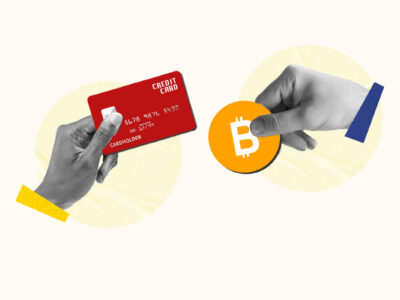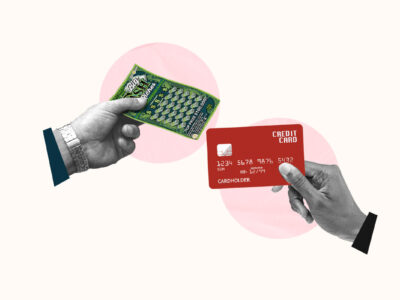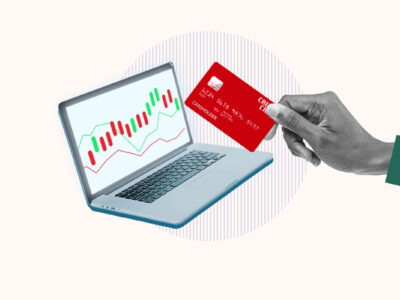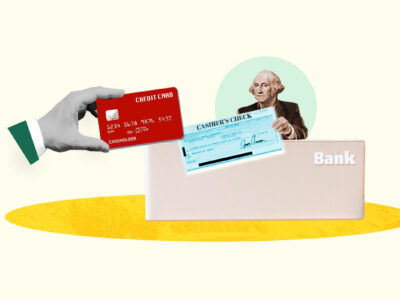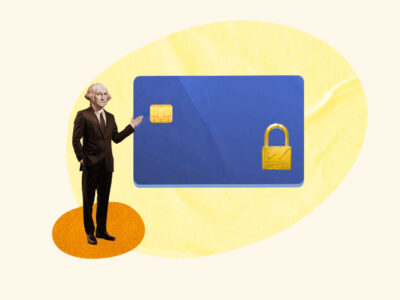Most people can’t afford to buy a new car upfront. While auto financing (taking out a car loan) is by far the most common solution to this problem, there’s another way to cover the purchase: using a credit card.
It’s often possible to buy a car with a credit card, and doing so has certain advantages. However, it also comes with serious risks that you should consider before deciding whether it’s the right option for you.
Do car dealers accept credit cards?
Many dealerships accept credit cards as a form of payment, but they won’t necessarily allow you to pay the full purchase price with your card. Car dealers are free to set their own policies on this—there are no laws covering it.
Some dealers will allow you to buy a car outright with a card, some will only allow you to use your card for your initial down payment, and others may decide on a case-by-case basis, depending on the cost of the car you’re buying.
Even the dealers that allow you to pay with your card may charge “convenience fees” that will substantially add to the price of your car.
Why do some car dealers restrict credit card payments?
Car dealerships, like all businesses, need to pay credit card processing fees, which may be 2% or more of the transaction amount. 1
This has the potential to cost them hundreds of dollars, depending on the price of the vehicle. That’s why some dealers refuse credit card payments, and why others will allow you to make a smaller down payment with a credit card but not pay for the car outright.
Again, this comes down to your car dealer’s policies. The only way to know for sure whether they’ll allow it is to call and ask them.
Should you buy a car with a credit card?
Most of the time, it’s a mistake to buy a car with a credit card. That’s because credit cards usually have much higher interest rates than loans, so using a card will almost always be more expensive than taking out an auto loan.
Also, for reasons that we’ll cover later, making very large purchases on your credit card can damage your credit score.
However, there’s one exception when it can be worth it to buy a car with a card: if you’re able to get a credit card with a 0% interest rate, you can avoid paying any interest at all. In this case, it’s possible the advantages will outweigh the disadvantages.
Advantages of using a credit card to buy a car
Buying a car with a credit card can have the following advantages:
- Potential to buy your car interest-free: If you use a credit card that has a 0% APR introductory period and you pay off your balance before it ends, then you could get out of paying any interest on your car purchase.
- No need for loan approval: If you use a credit card, you don’t need to worry about applying for car loans or getting approved for auto financing. You’ll be able to walk right into the car dealership and drive out with the car you want.
- Credit card rewards: If your credit card has good rewards or a welcome bonus that’s activated when you spend a certain amount, then you may be able to earn credit or cash back by using your card to buy a car.
- No risk of repossession: Since you’re not using an auto loan to finance your new car, you won’t risk repossession if you fail to pay off your debt (although you’ll probably face other consequences from your credit card issuer that aren’t much better).
Disadvantages of using a credit card to buy a car
Even with the best credit card, you should think carefully before charging the full cost of a car (or even just the down payment) to it. There are several serious downsides:
- Higher interest rates and fees: Again, credit cards generally have higher interest rates than car loans. Unless you have a zero-interest credit card and you can afford to pay off the balance during the interest-free period, using a credit card to buy a car will be much more expensive than taking out a loan.
- High credit limit required: Unless you’re getting a very cheap car, you’ll need a fairly high credit limit to be able to put its whole cost onto a credit card.
- Drop in credit score: If you use more than 30% of your credit card limit to pay for a car—which is likely—then your credit score may suffer due to an increase in your credit utilization rate (i.e., how much of your available credit line you’re using). This is one of the main factors affecting your credit score, so the damage to your credit score might be severe.
- Less money available to spend on your credit card: If you’re in the habit of using your credit card regularly, then using up too much of your available credit may put you in a tough spot financially and make it harder to cover other expenses unless you increase your credit card limit or open a new credit card account.
- Risk of debt collection: Although you won’t need to worry about repossession, your credit card company may send your debt to a debt collection agency if you fail to repay it. This will seriously damage your credit and finances.
Ultimately, there’s a reason why using a credit card is an unconventional way to buy a car. It’s a bad idea unless you’re taking advantage of a 0% interest offer and you think you’ll be able to quickly repay your debt.
If either of those doesn’t apply to you, another payment option is almost certainly the way to go.
Tips for buying a car with a credit card
If you’ve decided to use a credit card to purchase a new or used car, there are a few steps you should take to protect your credit and financial health throughout the process.
Choose a good credit card for buying a car
Don’t use just any old credit card to buy a car. As we’ve said, it’s best to use a card with a 0% APR period to avoid getting hit with steep interest fees. The longer this period is, the better.
To make the most of your purchase, you should use a card that also has one or more of the following features:
- High credit limit
- High cashback rewards rate
- Large welcome bonus for large purchases
- High rewards especially for car purchases
Bear in mind that you’ll need a good credit score to qualify for the best credit card offers. Also, rewards cards may come with an annual fee that you should factor into your car-buying budget.
Notify your credit card issuer before you buy a car
It’s a good idea to contact your credit card company and let them know that you plan on using your card to buy a car before you go through with the purchase. Otherwise, you risk having your credit card declined at the dealership.
Card issuers will sometimes block or put a hold on very large transactions until they can verify that you’re actually the one making the purchase. This is a simple security feature designed to protect you from credit card fraud, but it can put the brakes on your plans to buy a car if they don’t know about the purchase beforehand.
Explore your options at multiple car dealerships
Regardless of how you plan to pay for your new car, it’s always a smart move to scope out your options and compare offers. This is the only way to know you’re getting a good deal on the car you want.
Comparing prices is all the more important when you plan on charging some or all of the car purchase to your credit card, since some car dealers may be inclined to charge you higher rates or fees to compensate for the card processing fees.
Pay off your credit card debt as soon as possible
When using a credit card to buy a car, it’s very important to consider how much time you’ll need to repay the debt. Plan out your budget carefully to ensure that you don’t rack up high interest charges on a large credit card balance.
If you’re taking advantage of an interest-free promotional period on a new credit card, make sure that you fully pay off your debt before the end of the introductory 0% APR period ends.
If it ends up taking longer to pay off your car than you planned, you might be able to perform a balance transfer onto a new zero-interest credit card, but you’ll need good credit to do this. You may also need to pay a balance transfer fee.
Other ways to pay for a car
Using a credit card to buy a car is unconventional. Although it has some advantages over typical auto financing, you should still seriously consider the alternatives:
The most common approach is, of course, to just take out an auto loan. You’ll need to apply for one from a bank or financial institution.
You can also explore these options:
- Get dealership financing: Car dealerships often offer their own in-house financing. They may charge you a bit extra, but their credit requirements may not be as strict as other auto lenders and you won’t need to apply for a car loan from a bank.
- Get a cosigner: One of the most popular ways to get a car with poor credit is to ask someone with good credit to cosign your auto loan application. Just make sure they understand that they’ll be on the hook for your debt if you stop making payments—and make sure your finances are in order so that won’t actually happen.
- Pay in cash: If you have enough cash on hand to buy a cheaper car, then you’ll save money and stress by simply paying for the car upfront. Check that the car is in good working condition so you don’t lose money on car repair fees down the line.
- Trade in your current car: Some car dealerships offer trade-ins, which allow you to put the value of your current car towards the purchase of your new car. Even if you’re only able to shave a couple of thousand dollars off your down payment, this could make the whole purchase much more affordable.
Regardless of what approach you take to cover the purchase of your next car, it’s important to assess your finances and budget before deciding. This way, you won’t strain your finances or put your credit at risk.
